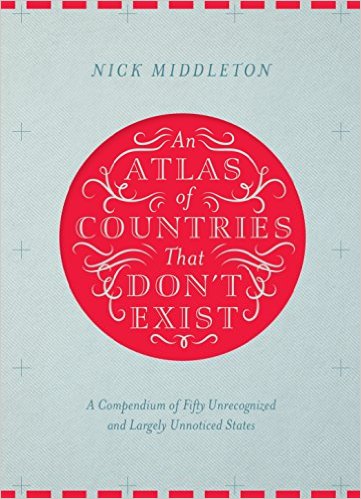Review: Atlas of Countries that Don’t Exist December 16, 2015
Author: Beach Combing | in : Contemporary, Modern , trackback***Thanks to Ricardo for sending this one in***
One of the most heart-breaking aspects of the rise of ISIL/ISIS/DAESH is the way the Daeshites have butchered their way through the brilliantly coloured mosaic of ethnic, linguistic and, of course, religious tiles, in northern Iraq. In twenty years when the Caliphate has been consigned to the dustbin of murderous self-indulgence that mosaic will be just a memory: like the multi-linguistic melting pots of Central Europe from Warsaw to Sarajevo, eaten up by Stalin, Hitler and other enemies of asymmetry. But humans, thankfully, are asymmetrical and our refusal to conform will emerge again and again. Beneath the grey crust of our legally appointed lives (passports, income tax and census forms) there is the churning magma of our real lives and here you will always find messiness and non-conformity. Our worth, our force and our strength as a species depends upon it. If writers in the humanities have a duty it is in part to remind us of the fact of human chaos and this brings us to Nick Middleton’s Atlas of Countries that Don’t Exist: A Compendium of Fifty Unrecognized and Largely Unnoticed States.
The format follows closely that of a Beachcombing favourite: Atlas of Remote Islands. There is loving attention paid to maps and controlled, but lyrical summaries of subjects: in this case the sorry ‘countries’ that fell between the geopolitical cracks. Some of these have enjoyed their time with the dust mites, and have been protected by their isolation: the Isle of Man, say. Others have been sucked up into the vacuum cleaner of carnivorous nearby states: Tuva or the Sioux’s Black Hill homelands. Then, there is the simply bizarre: the islands that had been missed off the Philippines’ maps, Moroc-Songhrati; or a personal favourite, Tonga’s invasion of a Libertarian experiment on Minerva, featuring an Oceanic Jabba the Hutt, and a police brass band. (If you are invaded by Tonga then you know that you have not made the grade as a state.) In the end Beach prefers The Atlas of Remote islands. Perhaps because he knows a lot of the bizarrities in this volume: whereas some of the Remote Islands caught him by surprise. Or perhaps because, in the end, the irregular and messy human realities are enlivening but fatiguing. Islands are restful, African bush wars can only remind us of just what a sorry mess we’ve made of our Eden.
Beach is always looking for great books: drbeachcombing At yahoo DOT com



